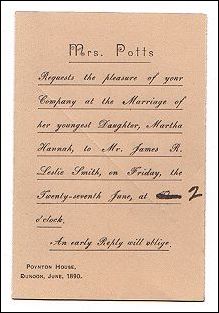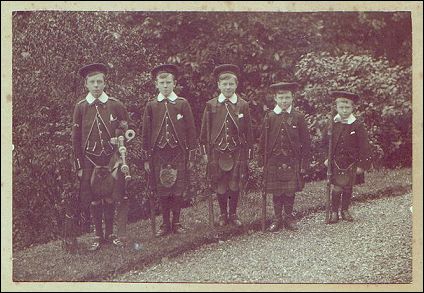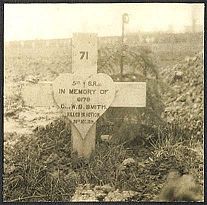James Robert Leslie Smith
One of the fads of the late Victorian era was phrenology - the supposed science of reading a person's character from the details of the shape of their head. James and perhaps others in his family were not immune to the fashions of their day, and we have a phrenology reading which was done for James in 1870.
Phrenology reading for James Robert Leslie Smith
 Around 1870 James joined his father in the clothiers business his father had built up in Dunoon, and in 1890, he married Martha Hannah Potts. The invitation card shown on the right reads:
Around 1870 James joined his father in the clothiers business his father had built up in Dunoon, and in 1890, he married Martha Hannah Potts. The invitation card shown on the right reads:
Mrs Potts
Requests the pleasure of your
Company at the Marriage of
her youngest Daughter, Martha
Hannah, to Mr. James R.
Leslie Smith, on Friday the
Twenty-seventh June, at 2
o'clock.An early Reply will oblige.
Poynton House,
Dunoon, June, 1890.
James inherited the business when his father died in 1902. The family was well established and respected in the area, and much involved in local politics and affairs. From the story handed down in the family, it appears that James was more interested in the political and social aspects of his life as a prosperous merchant, and left the running of the business to his manager. Unfortunately, his choice of manager was a poor one, and one day he woke up to find that the manager had run off with most of the money and the chief seamstress, having first run up large debts in the name of the business. James had to sell up what little was left to pay his creditors, and moved to Glasgow.
He and Martha had five sons and one daughter, listed here from eldest to youngest:
- Robert Leslie Smith ("Leslie")
- Margaret Graham Smith ("Peggy")
- Walter Sinclair Smith
- James Robert Leslie Smith (my grandfather)
- John Graham Smith ("Johnny")
- Eric Sinclair Smith

The photograph above shows the five brothers, c.1907. The eldest, Leslie, shown on the left of the picture, is carrying a set of bagpipes. He was a talented player, and was much admired for his skill.
The First World War had a profound effect on the family. One after another the sons either volunteered or were called up for active duty.
Eric, the youngest, escaped the worst of the war, but was part of the occupation forces stationed in Europe immediately after the war.
 Walter was a tragically early casualty of the war. Serving with the 5th Scottish Rifles, he was in the trenches near Armentieres at Christmas, 1914. His unit was one of those which participated in the spontaneous Christmas truce, exchanging gifts with the Saxon unit of the German army which they were facing across no man's land. Walter was hit by a stray bullet late in the afternoon of Christmas day, and he died on 26 December 1914. This incident appears to have brought the temporary truce to an end on that part of the front line, though the Saxons made it clear that the bullet had not been fired by anyone in their unit - apparently it came from a neighbouring Prussian unit.
Walter was a tragically early casualty of the war. Serving with the 5th Scottish Rifles, he was in the trenches near Armentieres at Christmas, 1914. His unit was one of those which participated in the spontaneous Christmas truce, exchanging gifts with the Saxon unit of the German army which they were facing across no man's land. Walter was hit by a stray bullet late in the afternoon of Christmas day, and he died on 26 December 1914. This incident appears to have brought the temporary truce to an end on that part of the front line, though the Saxons made it clear that the bullet had not been fired by anyone in their unit - apparently it came from a neighbouring Prussian unit.
We have a letter to Walter's father from Walter's uncle and namesake, Walter Sinclair Smith, from Tallong, New South Wales, Australia, in response to the news of his death. In the letter, Walter (senior) refers to Walter (junior) as having died "a glorious death" and he urges James and Martha not to take it "to heart too much" - sentiments that would seem strange now, but which were quite normal at that time.
Letter to James Robert Leslie Smith from his brother in Australia, on the death of his son Walter
A newspaper clipping from 1915 reads as follows:
THE LATE CORPORAL SMITH
Dunoon and Kilmun School Board have resolved to send a minute of sympathy to the family of Corporal Smith, of the 5th Cameronians, who was killed in the trenches on Christmas Day.
Corporal Smith's family were closely connected with the public life of Dunoon, his grandfather having been Provost and his father a Town Councillor and Major of the local artillery. Both carried on business for many years in the town.
The young corporal was known to everybody in Dunoon, having been an enthusiastic member of the Grammar School Cadet Corps, which is recognised by the War Office and attached to the 8th Battalion Argyll and Sutherland Highlanders.
Walter was one of the first soldiers to be buried in what would later become the Cité Bonjean Military Cemetery at Armentieres in France, now cared for by the Commonwealth War Graves Commission.
Copy of Walter's record from the Commonwealth War Graves Commission database
Johnny was a keen and gifted amateur photographer, and put his skills to use, both officially and unofficially, during the war. We have him to thank for many of the WW1 photographs in " Pictures of the Past ". He joined the Royal Flying Corp (later the Royal Air Force), working in aerial reconnaissance. However, late on in the war he was shot down and severely injured. His brain was damaged, and he never fully recovered, being prone to extreme mood swings and violent outbursts. He spent some time in Erskine Hospital, a Scottish hospital for disabled ex-Service men and women. Sadly, he took his own life in 1946, at which time he appears to have been living in a flat in Glasgow. We only discovered this late in 2002 when we viewed his entry in the Register of Deaths via the Scotland's People website. The family had always believed he died naturally in Erskine Hospital. His brothers, who dealt with the formalities at the time of his death, must have decided that it would be too upsetting for their mother, their wives and their children to know the truth about how Johnny died.
Leslie appears to have survived the war relatively unscathed, reaching the rank of (Acting) Captain.
James, my grandfather and a keen shot (he was deployed as a sniper during the war, and later won many prizes at Bisley), was wounded (a rifle bullet in the arm) and sent back to the UK to recover. He returned to active duty, but was taken prisoner early in 1918. It was six months after he was posted as missing in action before news reached his family that he had been taken prisoner and that he was alive and well. He spent the final year of the war as a prisoner of war at Pforzheim (photographs from Pforzheim prisoner of war camp).
After the war, Eric married Jean Muir and Leslie married (Sergeant) Barbara M Sharp who had been working as an RAF driver - she is pictured in "Women in Wartime" in " Pictures of the Past ".
James married Dolina ("Dolly") MacLeod, a girl from Aberdeen who had been working as a governess in Canada, and who subsequently gave birth to Joyce, my mother and their only child.
James Robert Leslie Smith (senior) died of kidney failure at 391 Lincoln Avenue, Glasgow (their home since just before WW1) on 25 September 1930, aged 75. His wife, Martha, died 16 years later in 1947 aged 85. She was living in Birmingham at the time, with her son, Eric, and his family, but was brought back to Glasgow to be buried in Hillfoot cemetery.
SMITH - Peacefully, at 42 Kensington Road, Birmingham, 29, on 27th December, 1947, Martha Hannah, in her 86th year, beloved wife of the late Major J. R. Leslie Smith, Dunoon. - Service at Wylie & Lochhead, Ltd., 33 Bath Street, Glasgow, on Wednesday, at 2 p.m.; funeral thereafter to Hillfoot Cemetery; flowers to Wylie & Lochhead, Ltd.
My grandfather, James, died in August 1961. The following obituary was published in the Dunoon Herald and Cowal Advertiser, 19 August 1961.
OBITUARY
Mr J R Leslie Smith, Duart Tower, Blairmore
Mr J R Leslie Smith, who has had a lifetime connection with Dunoon and district, passed away at a hospital in Dunoon on Friday of last week.
Born in Dunoon, he was the third son of the late Major J R Leslie Smith, V.D., R.G.A., and Martha Hannah Smith.
Mr Smith, like his father, was a keen Territorial, and served during the First World War with the 5th Scottish Rifles, earning the coveted Mons Star. He later served as Adjutant in the Royal Scots, and was wounded and held a prisoner of war in Germany. He was a well-known rifle shot and marksman at Bisley, where he gained many prizes.
Mr Smith was educated at Dunoon Grammar School, and graduated into the electrical profession. He later became Scottish Sales Manager for Crompton Parkinson until his retirement.
During the Second World War, despite the fact that his services were vital to his firm in the war effort, he gave all his spare time to the Home Guard, and held the rank of Major in the Edinburgh Battalion.
Sailing, boating, fishing and radio were a few of his hobbies, and in his boyhood days one would always find him "messing about in boats". He took a keen interest in the British Legion (Blairmore Branch), of which he was recently appointed Secretary, and many other social activities. Politically his principles were based on loyalty to his country and what he thought was right.
Of a family of six - five boys and one girl - he is survived by his wife and daughter, and two brothers and a sister.
Mr R L Smith, the deceased gentleman's grandfather, was one of Dunoon's earliest Provosts.
The funeral took place on Tuesday at Greenock Crematorium, and was attended by a large number of relations and friends.
![]() http://www.users.zetnet.co.uk/dms/lsfamily/jrlsmith.html
http://www.users.zetnet.co.uk/dms/lsfamily/jrlsmith.html
© 1998-2005 Donna Smillie <dms@zetnet.co.uk>
